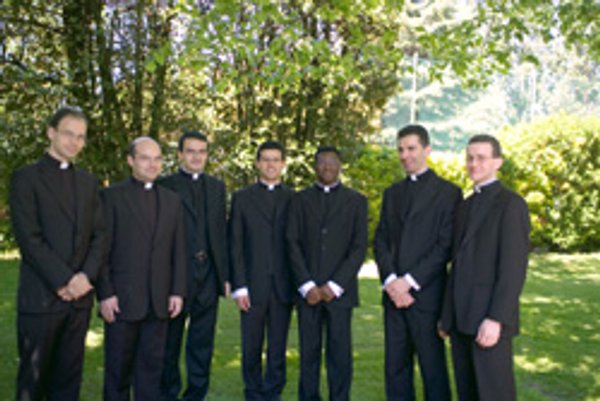Anthony’s father was Anglican and his mother Catholic. After secondary school and completing his engineering degree in 1997 at Obafemi Awolowo University, he packed his bags and left for Spain. He has lived in Europe ever since. In Rome he studied philosophy and theology; his doctoral dissertation concerns the magisterium of Pope Paul VI on the participation of the lay faithful in public life.
To whom do you owe your priestly vocation?

Obviously, to Our Lord; every vocation comes about through God’s infinite mercy. But no doubt he normally works through many people when he wants to call one of his children to a special dedication. In my case, the Founder of Opus Dei played a decisive role. But as he said, 90% of our vocation we owe to our parents; this expresses in a graphic way the high degree of gratitude we owe to them. In spite of the faithless life our family led, I can also say that the Virgin Mary was present. My maternal grandmother prayed the Rosary every day, and whenever we went to visit, she would invite us to pray it with her.
How have your relatives and friends reacted to your ordination?
I think they are all pleased. I’m glad to say that I was brought up in a home where there was great respect for personal freedom. No one objected when I brought up matters of faith, nor when I decided to stop attending the Anglican church, nor when I joined Opus Dei. The only thing we four children were not permitted to question was the value of education, and the passage of time has shown how right they were about that. “What will sustain you in life is your formation,” they used to say when they encouraged us to study hard and with a sense of responsibility.
How does an African regard Europe?
That’s a hard question, and I always try to avoid it. I don’t like to make sweeping judgments that might be mistaken or offend people. With that said, I think what most surprises an African when he arrives in Europe is the sadness he sees on so many faces. One would like to see a bit more joy there.
And how does Africa look from Europe?
Africa is a large continent that continues to go through hard times—bloody wars, areas suffering from brutal poverty. But not all of Africa is in misery, and I’m convinced that it is a continent whose values give reason to be hopeful. This goes for the faith, too. For me, it’s very significant that in the last century God looked with favor upon the way great missionaries came to aid Africans. Thousands of men and women gave their lives in Africa, including some who died as martyrs. As Pope Benedict has said, it is to be hoped that the Church will bear fruit precisely in those places where people have suffered the most for Christ. Pope John Paul spoke of a “new missionary epoch” when he exhorted Africans “not only to save Africa, but also to send African missionaries to evangelize other nations.”
In the current discussion of culture and politics, what is the key question confronting the lay faithful?
I take this to refer to the situation in Europe and the West generally. The main problem is cultural relativism, as the Pope recently indicated, and that leads to moral relativism. Unfortunately, many people lay claim to the most complete autonomy for their moral preferences, and legislators think they are respecting that autonomy when they treat every possible conception of life as having equal value, and make laws contrary to the principles of natural morality. In my study of the Church’s social doctrine and the magisterium of Paul VI, I was able to show that the faith never tries to put social and political matters into rigid categories. The Church teaches that authentic freedom cannot be separated from truth. Another key question the lay faithful need to address has to do with this: Public life takes place in given historical circumstances, and these are always imperfect. It is necessary to try to modify them by working with the legitimate means a democratic legal system makes available to all the members of a political community.
Are you thinking of returning to Africa soon?
I certainly want to, but I could well be one of those John Paul II was thinking of when he said that Africans also have evangelize other peoples. As always, my Prelate is the one who will decide where the Church and my fellowmen need me. As a priest I want only to serve souls, without any distinction. This summer I expect to gain some pastoral experience in Spain, and perhaps I’ll go back to my country after that.
How will you remember Rome?
I have many, very many memories. Perhaps the most vivid one at present is the day the casket of John Paul II was brought from the Clementine Hall to St. Peter’s Basilica. As a deacon, I was able to participate in that ceremony and to see him up close, keeping him company, praying in a very special way in the midst of the throng that filled the Square. But in general, I’ll remember Rome as Rome is—a unique city in all the world. Now I understand why they say that it’s impossible to leave Rome. That would be to renounce an intimate possession, so profound that it is difficult to put into words—above all, for the mind of an engineer, like mine. The poets knew how to express it much better!
